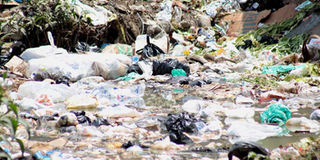Plastic pollution poses threat to water resources

Polythene bags in Ngong River in Industrial area, Nairobi, as pictured on August 29, 2017
What you need to know:
- The issue of plastic pollution in oceans dominated most of Tuesday’s panel discussions, with the growing human population singled out as one of its drivers.
- Plenty of plastic usually ends up in the ocean, where it harms marine biodiversity and can also fragment into small particles that are ingested by animals.
- Cases of attacks and piracy on ships and port facilities off the coast of Somalia and also in West Africa have been reported in the past.
The prospects of harnessing ocean and other water resources for economic growth could be endangered if plastic pollution, overfishing and other maritime threats such as piracy are not properly tackled.
And experts in the blue economy sector have cautioned governments to develop workable solutions to these challenges as the world gradually looks towards this part of the earth that previously seemed inhospitable and inaccessible.
Speakers on the second day of the Sustainable Blue Economy Conference in Nairobi raised concerns that land-based resources are becoming more stressed and, therefore, the need for countries to quickly address environmental and ecological sustainability.
The issue of plastic pollution in oceans dominated Tuesday’s panel discussions, with the growing human population singled out as one of its drivers.
WASTE MANAGEMENT
In one of the segments titled “Addressing waste management and the circular economy” Mr Doug Woodring of the Ocean Recovery Alliance said recycling plastics alone cannot stem their flow into the ocean.
Mr Woodring said there are different kinds of plastics and the worst of them are non-biodegradable, meaning they do not decompose and therefore accumulate on both land and at sea.
Additionally, countries that are seeking to benefit from the blue sector should also look into cutting the overall use of packaging bags and replacing these with more sustainable materials.
Plenty of plastic usually ends up in the ocean, where it harms marine biodiversity and can also fragment into small particles that are ingested by animals and indirectly by humans.
FOOD PACKAGING
“It’s impossible to get rid of all types of plastics because there is still a huge need for them in processes such as food packaging. What governments need to do is enforce proper ways of disposal,” Mr Woodring said.
The United Nations Environment Programme (Unep) has found that marine litter costs a minimum of $8 billion annually in damage to marine ecosystems.
Statistics also indicate that 80 per cent of all marine pollution starts on land. But governments worldwide are now paying more attention as consumer demands for environmentally friendly bags grows.
UN Habitat Executive Director Maimunah Sharif noted that uncontrolled and unprecedented urbanisation has had environmental implications especially on solid waste generation because of human activities. “What happens in the highlands and coastlands will eventually go into the ocean. If we don’t plan for the highlands, then we cannot talk about the blue economy, and therefore the need to have a holistic urban planning at all levels,” she said.
PLASTIC BAGS
Locally, President Uhuru Kenyatta, who addressed the governors and mayors’ convention said he was positive on the outlook of the sector, pointing out to the government ban on plastic bags. “We, therefore, urgently need to give priority to resource use implication and environmental impacts on urbanisation.
In planning the cities, we need to make them more compact to avoid urban slump and economise on the land under concrete,” Mr Kenyatta said.
Maritime security was also cited as an enabler of the blue economy. Cases of attacks and piracy on ships and port facilities off the coast of Somalia and also in West Africa have been reported in the past.
Acting Unep Executive Director Joyce Msuya said safeguarding navigational routes and providing oceanographic data would ensure marine resources are protected.
On overfishing, Kenya has pledged to ensure sustainable fishing to conserve the endangered stocks. “We will also ensure safety and security in the high seas so that global trade, connectivity and all business can thrive unhindered and unfettered,” President Kenyatta said on Monday.
INLAND PORT
Kisumu Governor Anyang' Nyong’o said his county was exploring the possibility of reviving the dormant inland port to connect the lakeside city with other counties and other towns in the Lake Victoria basin.
His Kilifi counterpart Amason Kingi said over-reliance on inland activities is to blame for the slow momentum Kenya has shown in taking up opportunities in the blue economy.






